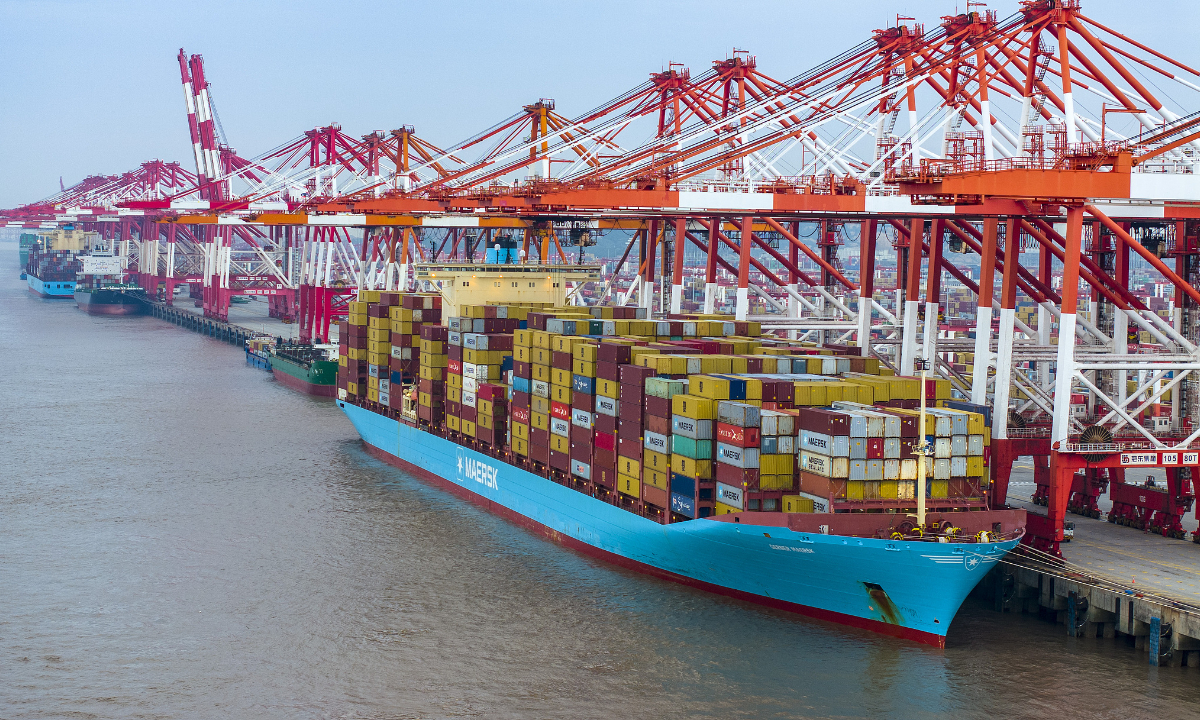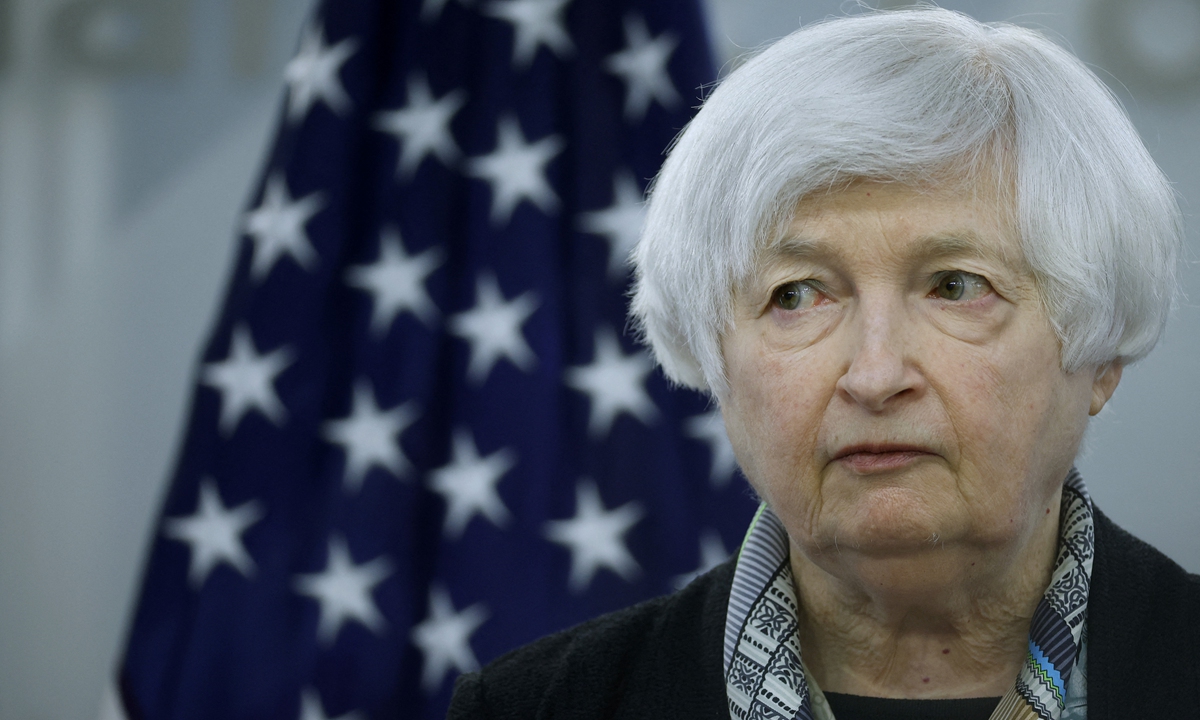China vows to promote steady growth of foreign trade
Nation resilient against external shocks, senior commerce official says amid US 60% potential tariff threat

Photo:VCG
Officials from five Chinese departments including the Ministry of Commerce (MOFCOM), the Ministry of Foreign Affairs and the People's Bank of China vowed to promote the steady growth of foreign trade at a press conference held on Friday in a move experts said is part of a package of policy measures to inject impetus and confidence into stabilizing the economy and help realize its annual economic targets.
Meanwhile, at the same press conference, the vice commerce minister highlighted China's capacity in dealing with external shocks in the first explicit, publicly known response by a senior commerce official to the impact of the US' potential 60 percent tariffs on Chinese imports. He stressed tariffs will only lead to high costs for consumers, and a stable, healthy and sustainable development of China-US economic and trade relations will benefit peoples of both countries and the world.
The press conference came after MOFCOM, together with the Ministry of Foreign Affairs, the Ministry of Industry and Information Technology, the People's Bank of China and the General Administration of Customs rolled out nine measures to support foreign trade, involving support and guidance in insurance, financing, cross-border trade settlement, expanding scope on imports and exports, optimization of trade structure, visa facilitation and transportation.
Analysts noted that the latest move will further enhance the confidence of Chinese foreign trade enterprises, thereby injecting a stable and strong impetus to economic development, helping the country navigate the complexities of the global market.
Policy support
During the press conference, Chinese Vice Commerce Minister Wang Shouwen noted that the policy is aimed at responding to changes in the international trade situation and promoting solutions to practical difficulties faced by foreign trade enterprises in financing and maritime transport.
The raft of policy measures aimed at promoting the steady growth of foreign trade was deliberated and adopted by a State Council executive meeting on November 8.
The Ministry of Commerce on Thursday unveiled the policy measures in a notice. Among the nine specific measures, financial institutions are encouraged to increase financing support for micro, small and medium-sized companies based on market-oriented and law-based principles.
Efforts should be made to optimize cross-border trade settlement, promote the development of cross-border e-commerce, expand agricultural product exports, and support the imports of key equipment and energy resources, said the notice.
The overall situation of China's foreign trade is relatively optimistic, but at the same time we should also see that uncertainties continue to accumulate. Maintaining stable growth in foreign trade and sustained improvement in competitiveness cannot be separated from policy support, Zhou Mi, a senior research fellow at the Chinese Academy of International Trade and Economic Cooperation, said on Friday.
"The timely joint efforts by five Chinese departments enhanced the confidence and expectations of Chinese foreign trade enterprises, and the measures will effectively help address problems of current foreign trade and future uncertainties," Li Yong, a senior research fellow at the China Association of International Trade, told the Global Times on Friday.
Stable growth in foreign trade can provide more impetus for the domestic economy. The nine measures are part of a package of policy measures to inject growth momentum and confidence into stabilizing the economy, which will help realize the country's annual economic targets, Wang Peng, an associate research fellow at the Beijing Academy of Social Sciences, said on Friday.
"Consumption, investment, exports and market sentiment all improved in October, and this trend is highly likely to continue in the last two months of the year, as the confidence of enterprises and consumers has been shored up thanks to the support policies," Wang Peng told the Global Times.
Resilient against external shocks
At the press conference on Friday, Wang Shouwen also stressed that China has the capacity in dealing with external shocks largely owing to its resilient and vibrant economy that has great potential in a response to a question on the impact of the US' potential 60 percent tariffs on Chinese imports.
China is building a "dual circulation" development pattern, which takes the domestic market as the mainstay while allowing domestic and international markets to reinforce each other. We are capable of resolving and withstanding the impact of external shocks, the official told reporters.
Wang Shouwen noted that history has also shown that the imposition of tariffs on China by a country does not solve the problem of its own trade deficit, on the contrary, it pushes up the prices of the country's imports from China as well as from other countries.
This is because the tariffs are ultimately paid for by the consumers and the end-users of the importing country, which inevitably leads to an increase in the prices paid by consumers and an increase in the costs to the users, which also leads to inflation, the vice commerce minister further elaborated.
The vice commerce minister said that China and the US are the two largest economies in the world, and have strong complementarities. We believe that if China and the US can maintain a stable, healthy and sustainable development trend in their economic and trade relations, it will be beneficial to both the Chinese people and the American people, as well as the people of all countries in the world, and this is also what the international community expects, he said.
China is willing to engage in dialogue with the US on the basis of the principles of mutual respect, peaceful coexistence and win-win cooperation, in a bid to expand areas of cooperation, manage differences, and promote the stability of the bilateral trade and economic and trade relationship, Wang Shouwen said, noting that China will also firmly safeguard its own sovereignty, security and development interests.
Chinese companies have advantages in ordering, transportation, warehousing and other export-related areas that are difficult for other countries to replace, due to their complete supply chain and high production efficiency, Li said.
"Moreover, the country's economic resilience provides enough market size to address some of the external risks. In particular, China has continued to promote new dynamics in foreign trade and new quality productive forces, which will cultivate new international competitive advantages," Li noted.
"Years of China-US trade and investment have made the two sides interdependent. In addition to providing US consumers with cost-effective products, China's exports of its intermediate products have become embedded in the US supply chain and have become part of the competitiveness of many US industries," Li said, noting that the US needs to maintain rationality in its economic and trade policy toward China.



